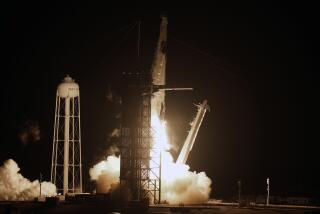China to Orbit Two Satellites for U.S. Firm
- Share via
PEKING — China will use its Long March 3 rockets to launch two satellites for an American company, the official China Daily reported today. The company said it struck a deal with China because NASA could not guarantee a launch date.
The aerospace firm Teresat Inc. of Houston, signed the agreement with China Great Wall Industry Corp., a division of China’s Astronautics Ministry, the English-language Chinese newspaper said.
In Houston, the president of Teresat said the company turned to China to put its communications satellites in orbit because NASA has grounded the space shuttle program indefinitely.
Teresat President Henry A. Schwartz said Friday that the company would have preferred to send its satellites into orbit aboard a space shuttle but that the National Aeronautics and Space Administration “can’t give us a firm launch date.”
Schwartz added that “the Chinese were selected because they have launched 18 satellites since 1972 with only one failure.”
The U.S. space shuttle program was put on hold after the orbiter Challenger exploded on takeoff Jan. 28, killing all seven astronauts aboard. NASA officials have said the earliest the shuttle will fly again is next February.
NASA’s only major competitor, Arianespace, the European rocket consortium, is booked through 1988.
Teresat is negotiating to buy two satellites from Lloyds of London for about $50 million. The satellites were retrieved from space by NASA astronauts aboard the space shuttle Discovery in October, 1984.
The first Teresat satellite will be launched no later than December, 1987, Schwartz said. He did not say how much Teresat will pay for the service. No date was given for the launch of the second satellite.
The two satellites will be carried by the three-stage Long March 3 from China’s launching center in Xichang, Sichuan province.
More to Read
Inside the business of entertainment
The Wide Shot brings you news, analysis and insights on everything from streaming wars to production — and what it all means for the future.
You may occasionally receive promotional content from the Los Angeles Times.










